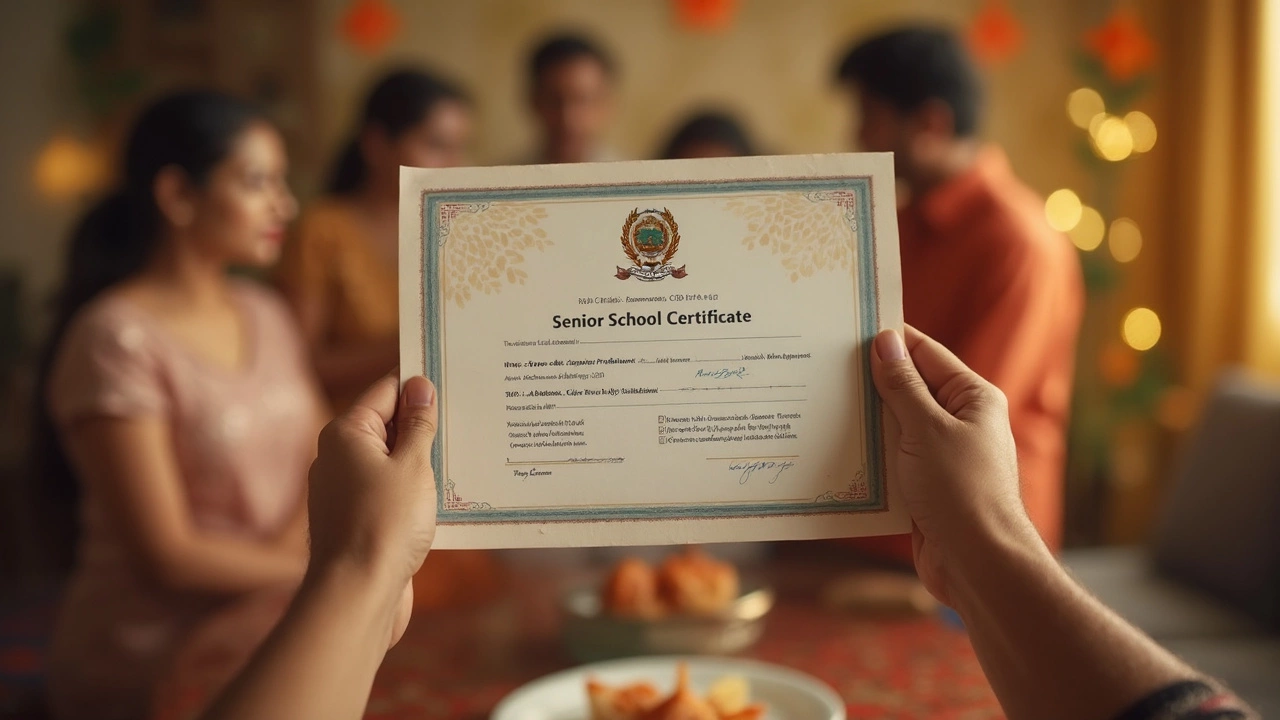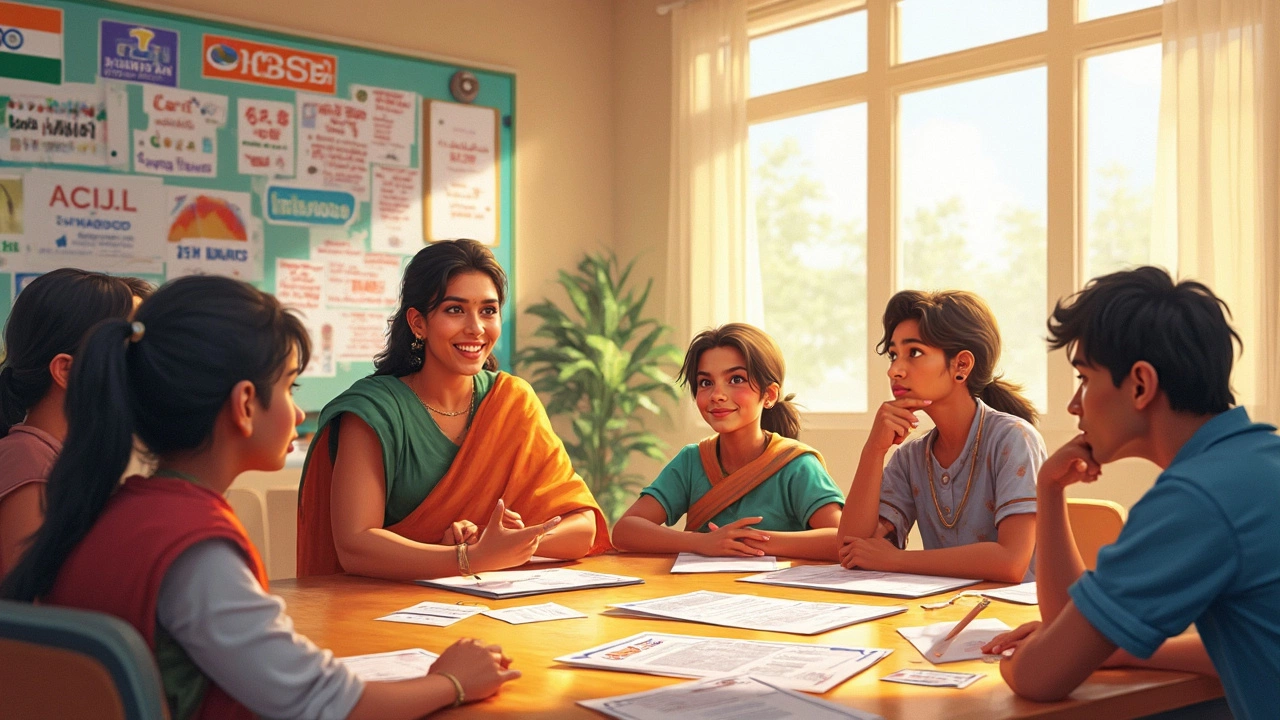If you’ve just finished school in India and someone asks, “What’s your highest qualification?”—getting the answer right actually matters. When people say “12th class degree,” what they really mean is the completion certificate for your final year of school. But nobody calls it a “degree” in India’s official lingo. The formal name is the Higher Secondary Certificate (HSC) or Senior Secondary Certificate (SSC), though a lot of forms will simply mention ‘Class 12 pass’ or ‘12th standard’.
The Central Board of Secondary Education (CBSE) calls this qualification the ‘Senior School Certificate’. So, when you finish your 12th with CBSE, that certificate is your golden ticket for college or job applications. Different states might use slightly different terms—some say ‘Intermediate’ or just plain ‘+2’—but in the end, they all mean you’ve cleared your 12th standard. Knowing the right name to use can save you a bunch of confusion while filling out online forms, applying for colleges, or even appearing for interviews.
- The Official Name of the 12th Class Qualification
- CBSE and Board Variations Explained
- Where and How to Use Your 12th Class Certificate
- Interesting Facts and Must-Know Tips
The Official Name of the 12th Class Qualification
If you’re trying to figure out the official label for the 12th class in India, you’re not alone. A lot of people use different terms, but the formal name on your certificate depends on your exam board. For CBSE students, it’s called the “Senior School Certificate.” Other boards might call it “Higher Secondary Certificate (HSC)” or “Intermediate Certificate.” No major board calls it a ‘degree’—that word is usually saved for college-level qualifications.
Here’s a quick cheat sheet for what different boards call the 12th class result in India:
| Board | Official Name on Certificate |
|---|---|
| CBSE | Senior School Certificate |
| ICSE (CISCE) | Indian School Certificate (ISC) |
| State Boards (Maharashtra, Tamil Nadu, etc.) | Higher Secondary Certificate (HSC), sometimes just “+2” |
| UP/Bihar Board | Intermediate Certificate |
So, if you’re filling out a college form and it asks for your qualification after school, you can safely write—“12th pass,” “Senior Secondary,” or use the exact name from your certificate. For job applications, most employers just care that you’ve finished the 12th standard. No need to stress about awkward terms like “12th degree”—that’s not a thing in India’s education system.
Quick tip: Whenever you send in scanned copies of your certificate, double-check that the name matches what’s asked on the form. Using the correct term can speed up the verification process and avoid unnecessary phone calls from admission offices or HR departments.
CBSE and Board Variations Explained
India's education scene isn’t one-size-fits-all. While CBSE is probably the most famous national board, it’s not the only player out there. You’ll also find state boards like UP Board, Maharashtra Board, Tamil Nadu Board, and others. And then there’s ISC (Indian School Certificate) from CISCE, which some schools across India follow. Each board uses its own name for that all-important 12th class certificate.
CBSE hands out the Senior School Certificate, which is what you get after passing the Class 12 exams. This is the board most folks think about if you say you follow the national syllabus. State boards, meanwhile, use terms like Higher Secondary Certificate (HSC) or just ‘+2 certificate’. The weird part? These all mean basically the same thing – you finished your 12th with that board and are now eligible for college-level education.
Here’s a quick look at how the naming varies across different boards:
| Board | Certificate Name |
|---|---|
| CBSE | Senior School Certificate |
| CISCE | Indian School Certificate (ISC) |
| Maharashtra State Board | Higher Secondary Certificate (HSC) |
| Tamil Nadu Board | Higher Secondary Certificate (HSC) |
| UP Board | Intermediate Certificate |
Notice that it doesn’t matter much which board issues your certificate. Universities and employers look for proof that you passed the 12th class—how the paper is named is just a formality. For most admissions and job forms, you’ll usually be asked if you’re a 12th class or ‘higher secondary’ pass. If you’re from a CBSE school, just say ‘Senior School Certificate’ if anyone gets picky.
Keep an eye out for the name your own board uses so you can fill out forms correctly. Mixing up terms can sometimes slow down your application or confuse the person on the other side.

Where and How to Use Your 12th Class Certificate
Your 12th class certificate is your proof that you’ve completed school and cleared the board exams. It’s the main document you’ll need for most things after school—college admissions, job applications, government forms, and sometimes even when getting your driver’s license or passport. So keep it safe and handy, because losing it can mean a lot of running around for a duplicate.
Here’s where this certificate actually matters:
- College Admissions: You can’t get into any undergraduate course in India without showing your original 12th certificate (plus marksheet).
- Job Applications: For most entry-level jobs, especially in the government or banking sector, employers ask for your 12th class qualification proof.
- Competitive Exams: UPSC, SSC, police, defence, and a bunch of other exams require you to be at least ‘12th pass’ to apply.
- International Studies: When applying to colleges abroad, you’ll need to submit a copy, usually called the ‘Higher Secondary Certificate’ or ‘12th grade marksheet’ in their forms.
When you fill out admission forms or job portals, always write the formal name based on your board. So, for CBSE, mention ‘Senior School Certificate’. For most state boards, ‘HSC’ or ‘Intermediate’ is safe. On regular forms, just ‘Class 12 pass’ works too as long as it matches your certificate.
Here’s a quick look at how different places in India call it:
| Board/Region | Official Certificate Name |
|---|---|
| CBSE | Senior School Certificate |
| State Boards (Most) | Higher Secondary Certificate (HSC) / Intermediate |
| ICSE | ISC (Indian School Certificate) |
| Tamil Nadu | HSC (Higher Secondary Certificate) |
| Andhra Pradesh, Telangana | Intermediate Certificate |
A tip: Most digital application portals now let you upload a scanned copy right away, so always keep a soft copy saved. If you lose your original, apply for a duplicate from your board as soon as possible. Remember, for getting into college in India, your 12th class marks can be a dealbreaker—some top colleges set specific cut-off percentages, and missing a mark can keep you out. So never underestimate the value of that one piece of paper!
Interesting Facts and Must-Know Tips
Let’s bust some myths and get straight to the stuff most people wish they knew earlier about the 12th class qualification in India.
- Your 12th class certificate is needed almost everywhere—college admissions, passport applications, jobs, and competitive exam forms. Lose it, and life gets complicated fast.
- People often get confused between ‘degree’ and ‘certificate’. In India, you only get a ‘degree’ after finishing university (such as BA, BSc, or BCom), not after passing 12th. The 12th result gives you a ‘certificate’.
- If you studied under CBSE, your certificate says ‘Senior School Certificate Examination’. Other state boards mostly mention ‘HSC’ or ‘Intermediate’.
- Lost your original? Don’t panic. Every board has a clear process for getting a duplicate. It’s usually online now, but you’ll need an affidavit and an FIR if it’s lost or stolen.
Want to know how many students actually pass? Here’s a quick comparison from the last few years (CBSE data):
| Year | Pass Percentage (CBSE 12th) |
|---|---|
| 2023 | 87.33% |
| 2024 | 87.98% |
That’s pretty solid—almost 9 out of 10 students clear their 12th on the first try.
- Don’t just scan and upload your certificate for safe-keeping. Take a physical photocopy and keep them in separate places. Some colleges or offices might ask for attested copies, so it saves time.
- If you’re applying abroad, most universities accept your 12th class certificate as proof of secondary education, but you’ll usually need it in English and may need to get it apostilled or notarized.
- Spelling errors in your name or parent’s name on the certificate can cause real headaches later. Double-check right now—fixing it is much easier within a year of results.
Finally, when filling out forms, if they ask for your ‘highest qualification’, just write ‘Senior Secondary (12th pass)’ or whatever matches your exact certificate. No one is checking for fancy words, just check that it matches your actual document.
